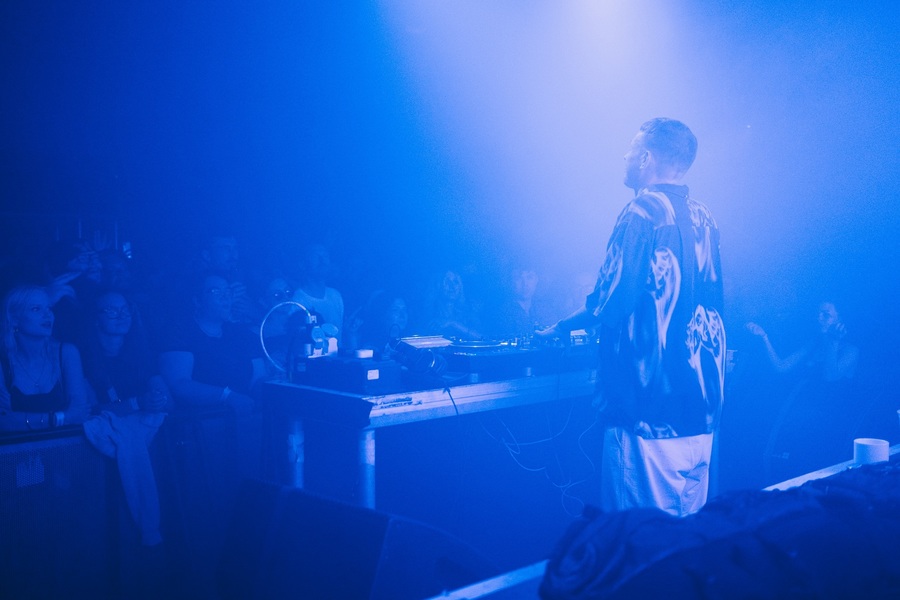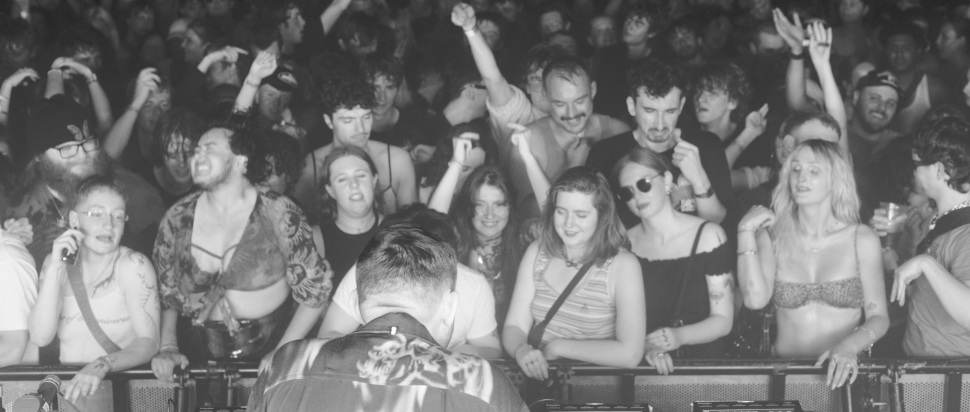WTF is a Hud Mo?: Keeping it weird with Hudson Mohawke
From remixing Starlight Express to scoring Wimbledon, Hudson Mohawke has made a career out of swerves. Back in Glasgow for a packed-out Numbers showcase, the LA-based artist reflects on chaotic homecoming, future work, and the art of keeping it weird
It’s hard to pin down a man who’s remixed Andrew Lloyd Webber, written the Wimbledon theme and landed a cameo in Twin Peaks. So when Hudson Mohawke – part musician, part chaos merchant – takes to the stage, the scene at The Art School feels as bizarre and brilliant as something out of the late David Lynch series.
It’s equally tricky to beat the bar queue, but after almost a decade, seeing the 39-year-old Grammy-nominated producer – real name Ross Birchard – return to the building that once served as home to Glasgow’s fightback against techno dominance feels more than worth the wait.
"I have a lot of memories from that venue... it was maybe the first venue I went out in as an under-18 in Glasgow with a chaperone," he recalls. While Birchard wasn’t a student there, The Art School became a formative weekly fixture for him, as well as for many others who sought something different in Scotland. It sat at a unique intersection where student-night perks met some of the most forward-thinking line-ups in the country.
"Half the crowd were there for the music, and half were students there because it was a pound a pint. For my whole teens and early twenties, it was one of the most popular and prestigious venues in the city.” Although, after two fires in the space of four years and prolonged financial problems, the chance to play – let alone dance – there “frankly wasn’t looking like it would be possible ever again,” admits the LA-based DJ and producer.
The venue helped launch artists like Hud Mo, Rustie, and the late SOPHIE to global acclaim, powered by the Numbers parties and label via the Glasgow-to-America pipeline that popped out of nowhere. "We were in the eye of the storm at that point and we didn’t even realise it," he laughs. As the city exploded onto the map around 2008, ‘aquacrunk’ was floated around to make sense of it all. Still, Birchard credits something simpler: a generation raised on Archaos happy hardcore, East Coast hip-hop, and dissatisfaction with “everything being fucking techno.”

Numbers at The Art School, May 2025. Image: Alan Morgan.
While he acknowledges, ironically, that we’ve come full circle since – with techno arguably more popular than ever – he raises the broader cultural shift outside of music where “people are calling Glasgow the new Berlin... the notion of someone even from England moving to Glasgow for culture wasn’t really thought of back then.” But for many downstairs in The Vic, neither was the Memphis-Scotland proudly screamed by DJ Spanish Fly mic in hand.
The Hud Mo homecoming Numbers showcase is packed to the rafters across two floors with Sega Bodega, Spencer, and Nabihah Iqbal in what feels like a highly-anticipated throwback. Birchard, however, is quick to resist the idea of reflecting too fondly. "I don’t really subscribe to this idea of 'back to the 90s or 00s'," he says. "I've always been of the opinion that you're setting out to make timeless work...our little scene back then was focused on this idea of out-newing each other."
“A lot of what Rustie, SOPHIE and myself were doing at the time was our take on American mainstream rap music... then a bunch of US artists (including Danny Brown, Rihanna and Kanye West) came to us for production.” Like the stripped-back noughties sound of the Neptunes or Timbaland, Birchard – who was behind Talk Talk on Charli xcx’s Brat – explains: “If you were to listen to them as instrumental tracks without the vocal, you’d hear it was an experimental producer behind it, but with familiar pop sensibilities there’s accessibility to it.”
That familiarity is the tool that helps new audiences “experience things we would have taken for granted.” But with Birchard – whether it’s scoring Watch Dogs 2 or nearly soundtracking the Kamala Harris presidential campaign, nothing is ever quite a given.
“I like to keep people on their toes, guessing, and wondering 'Why the fuck is he doing that?'" he smiles. "I remember getting an email for the Starlight Express remix and being like ‘Whit? That’s such a strange combination I have to do it.'” After six months of sitting with the stems, the long-awaited remix of The Race was finally released – much to the delight of Andrew Lloyd Webber.
Now splitting his time between the Tron soundtrack with Nine Inch Nails, albums for VTSS and Bb trickz, and a collaborative project with Dave Sitek, Birchard remains both masterful in his craft and mischievous in delivery. “It’s never meant to be comedic – I take what I do incredibly seriously,” he says. “But there’s an aspect of fucking with people that is very key to the whole thing. It’s not laugh-out-loud funny, but more confusing, or making people a wee bit uncomfortable… it’s that Scottish mindset of bamming people up.”
